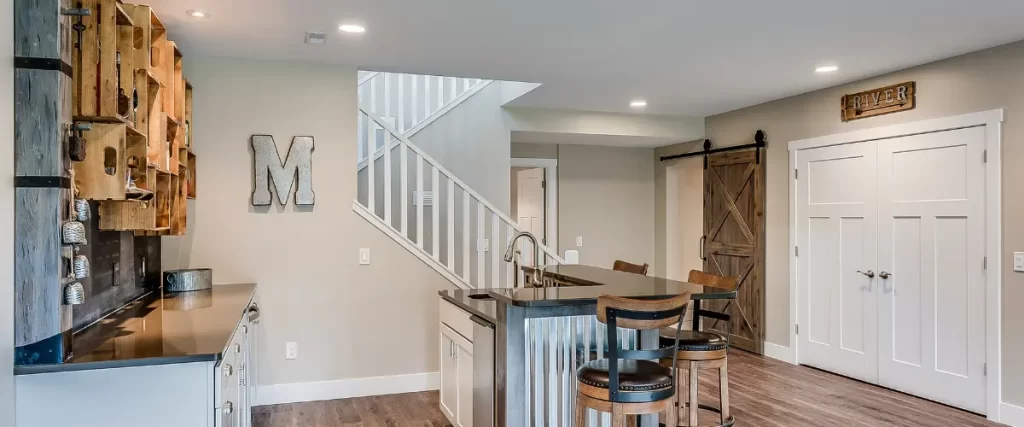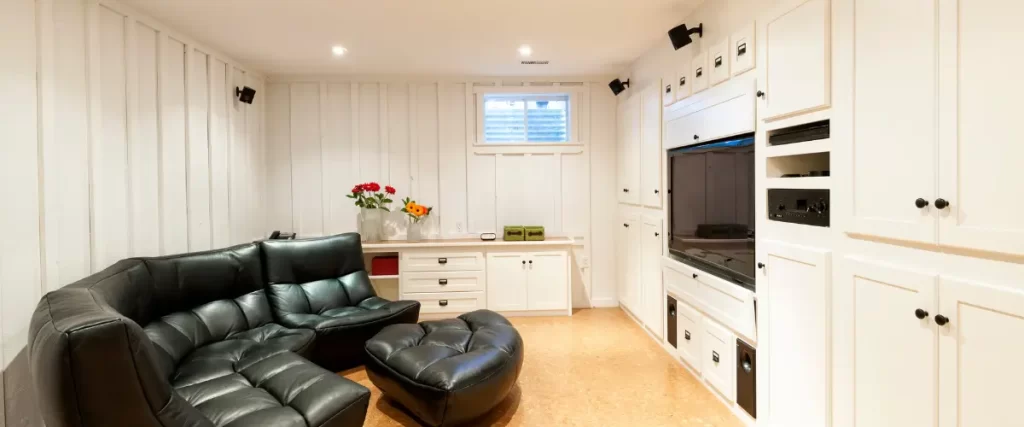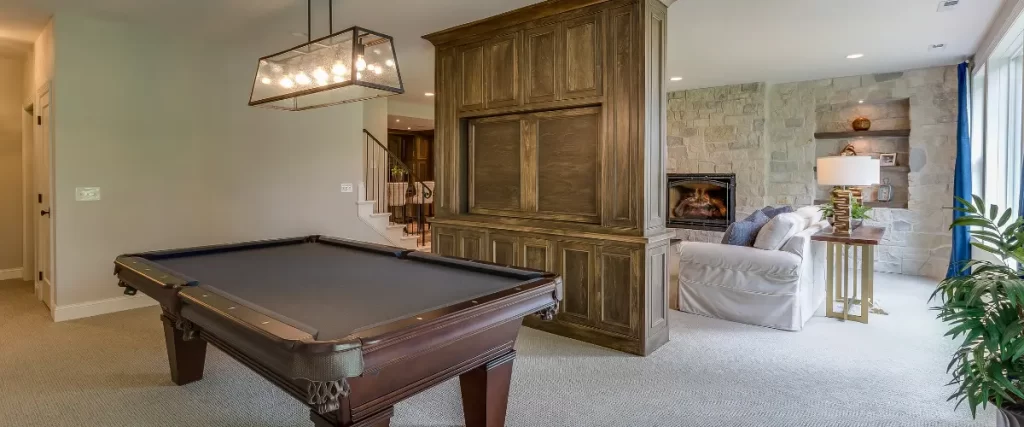Does the thought of those heavy spring downpours have you nervously eyeing your basement stairs? You’re definitely not alone! Here in the Big O, we know all too well how quickly a seemingly innocent spring shower can turn into a basement flooding nightmare.
Our unpredictable Nebraska weather, combined with the way many of our homes were built, can make basement water intrusion a real concern.
Think about it – our soil here in the Omaha area is largely clay-based. When it gets saturated with those consistent spring rains, it expands, putting pressure on your foundation walls. This pressure can lead to cracks, and guess where that water ends up? Yep, right in your basement.
And let’s not forget the history of our city; many older homes weren’t built with the advanced waterproofing techniques we have today. So, if you’ve noticed dampness, musty odors, or even standing water in your basement after a good rain, you’re not imagining things.
But don’t despair! The good news is that there are effective basement waterproofing strategies you can implement to protect your Omaha home from the ravages of spring rains. We’re your neighbors, and we’ve helped countless homeowners right here in the Omaha metro area tackle their basement water issues.
Consider this your go-to guide, packed with actionable advice and local insights to help you keep your basement dry and your peace of mind intact. Let’s dive in and fortify your foundation against those Nebraska spring storms!

Why Basement Waterproofing is Crucial for Omaha Homes
Living in Omaha means embracing all four seasons, and unfortunately, that includes some pretty significant rainfall in the spring. Ignoring potential basement water issues can lead to a whole host of problems that can impact your health, your home’s structural integrity, and your wallet:
- Mold and Mildew Growth: Damp basements are breeding grounds for mold and mildew. These fungi can release spores into the air, leading to respiratory problems, allergies, and other health issues for you and your family. That musty smell in your basement? That’s often a telltale sign.
- Structural Damage: Constant water exposure can weaken your foundation walls and floor. This can lead to cracks, bowing, and even structural failure over time, which can be incredibly expensive to repair. Remember that clay soil we talked about? The freeze-thaw cycle in our winters, combined with saturated soil in the spring, puts significant stress on foundations.
- Damage to Belongings: If you use your basement for storage or as a living space, flooding can destroy furniture, electronics, clothing, and other valuable items. The emotional toll of losing cherished possessions can be just as significant as the financial loss.
- Reduced Home Value: A damp or leaky basement is a major red flag for potential homebuyers. It can significantly reduce your home’s value and make it harder to sell down the line. Addressing waterproofing issues proactively protects your investment.
- Pest Infestations: Damp basements attract pests like insects and rodents, who thrive in moist environments. These unwanted guests can cause further damage and introduce health concerns.
Investing in proper basement waterproofing is not just about keeping your basement dry; it’s about protecting your health, your home, and your financial well-being right here in Omaha.
Identifying the Sources of Basement Leaks in Omaha
To effectively waterproof your basement, you first need to understand where the water is coming from. In Omaha, common sources of basement leaks include:
- Foundation Cracks: As mentioned earlier, the pressure from saturated clay soil can cause cracks in your foundation walls and floor. Water can seep through even hairline cracks.
- Wall-Floor Joint: The point where your basement walls meet the floor is a common entry point for water. This joint can shift and settle over time, creating gaps.
- Porous Concrete: Concrete itself is not entirely waterproof and can absorb moisture over time, especially if it’s not properly sealed.
- Window Wells: If window wells are not properly drained or covered, they can collect rainwater and allow it to seep into your basement through the window frame. Leaves and debris can clog drainage systems.
- Overland Flooding: In areas of Omaha prone to poor drainage or near waterways, heavy spring rains can sometimes lead to overland flooding that enters basements through doors or low-lying windows.
- Plumbing Leaks: While not strictly “groundwater” issues, leaks from internal plumbing can also contribute to basement dampness and should be addressed.
Taking the time to inspect your basement after a heavy rain can help you identify the primary sources of water intrusion and determine the most appropriate waterproofing strategies for your specific situation in Omaha. Look for damp spots, water stains, and efflorescence (white, powdery mineral deposits left behind by evaporating water).
Effective Basement Waterproofing Strategies for Omaha Homeowners
Now for the solutions! Here are several effective basement waterproofing strategies that Omaha homeowners can consider, ranging from simple DIY fixes to more comprehensive professional installations:
Exterior Waterproofing Methods
Addressing water issues from the outside is often the most effective long-term solution, as it stops water from even reaching your foundation.
- Grading and Landscaping: Ensure the ground around your foundation slopes away from your house by at least six inches over the first ten feet. This helps to direct surface water away. Consider adding landscaping features like swales or French drains to further channel water away from your foundation.
- Gutter and Downspout Management: Make sure your gutters are clean and free of debris so they can effectively collect rainwater. Extend your downspouts at least 4-6 feet away from your foundation to prevent water from pooling near the walls. Consider adding downspout extensions or underground drainage systems to carry water even further away.
- Exterior Waterproofing Membrane: This involves excavating around your foundation down to the footing and applying a waterproof membrane to the exterior of the walls. This creates a physical barrier against water intrusion. Often paired with a drainage board to help channel water down to the footing drains. This is a more involved and costly solution but highly effective for preventing water from entering the foundation.
- Footing Drains (Perimeter Drains): These perforated pipes are installed around the perimeter of your foundation footing to collect groundwater and channel it away from your basement. They are crucial for relieving hydrostatic pressure. If your home doesn’t have them or they are clogged, consider having them installed or repaired. The collected water is typically directed to a sump pump.
Interior Waterproofing Methods
Interior methods focus on managing water that has already entered your basement. While they don’t stop the water from getting in, they can effectively prevent it from causing damage.
- Interior Sealants and Coatings: For minor leaks and dampness, applying waterproof sealants or concrete coatings to your basement walls and floor can help. However, these are generally not long-term solutions for significant water intrusion. They can be helpful for addressing porous concrete.
- Interior Drainage Systems (French Drains): These systems involve installing a channel along the perimeter of your basement floor to collect water that seeps in. The water is then directed to a sump pump for removal. This is a common and effective way to manage water that enters through the wall-floor joint.
- Sump Pump Systems: A sump pump is essential for removing water that collects in an interior drainage system or from footing drains. It sits in a sump pit and automatically pumps water out of your basement. Ensure your sump pump is properly sized, has a backup power source (critical during Omaha storms!), and is regularly maintained. Consider a battery backup system in case of power outages.
- Dehumidifiers: While not a direct waterproofing method, a dehumidifier can help to reduce humidity levels in your basement, preventing mold growth and making the space more comfortable. However, it won’t stop water leaks.
Addressing Specific Problem Areas
Sometimes, you might need to focus on specific areas where water is entering:
- Window Well Drains and Covers: Ensure your window wells have proper drainage to prevent water from accumulating. Clean out any debris regularly. Consider installing clear plastic covers to keep rain and snow out.
- Crack Repair: Small cracks in your foundation walls can often be repaired with epoxy or polyurethane injections. For larger structural cracks, consult with a foundation repair specialist in Omaha.
- Plumbing Leak Repair: Address any internal plumbing leaks promptly to prevent them from contributing to basement dampness.

DIY vs. Professional Basement Waterproofing in Omaha
Depending on the severity of your basement water issues and your comfort level with home improvement projects, you might consider either DIY or professional basement waterproofing.
DIY: For minor issues like sealing small cracks or improving gutter drainage, DIY solutions can be effective and cost-saving. However, for more significant problems like foundation cracks, exterior waterproofing, or installing drainage systems and sump pumps, it’s generally best to hire a qualified basement waterproofing contractor in Omaha.
Professional Waterproofing: Experienced contractors have the expertise, specialized equipment, and knowledge of local building codes to properly diagnose the cause of your leaks and implement the most effective solutions. They can also provide warranties on their work, giving you peace of mind. When choosing a contractor in Omaha, be sure to check their references, read online reviews, and get multiple quotes.
Local Regulations: Keep in mind that some basement waterproofing projects, especially those involving excavation or significant structural changes, may require permits from the City of Omaha. Check with the Planning Department to ensure you’re following all local regulations.
Top Manufacturers of Basement Waterproofing Products
Choosing high-quality products is essential for effective and long-lasting basement waterproofing. Here are some of the top manufacturers in the industry:
Leading Sump Pump System Manufacturers
A reliable sump pump is the heart of many Omaha basement waterproofing systems.
- Zoeller Pump Company: Known for their durable and reliable submersible sump pumps, often considered a top choice by professionals.
- Liberty Pumps: Offers a wide range of high-quality sump pumps, including those with built-in backup systems for added protection.
- Wayne Pumps: Provides a variety of sump pumps known for their performance and value, suitable for various residential needs.
Top Foundation Waterproofing Membrane Manufacturers
Effective exterior waterproofing membranes are crucial for preventing water intrusion at the foundation level.
- W. R. Grace & Co: A leading manufacturer of self-adhesive waterproofing membranes known for their durability and effectiveness.
- Carlisle Coatings & Waterproofing: Offers a comprehensive range of waterproofing membranes and coatings for various foundation types.
- Tremco Commercial Sealants & Waterproofing: Provides high-performance waterproofing solutions for both residential and commercial applications.
Top Interior Drainage System Manufacturers
Reliable interior drainage systems help manage water that enters the basement and direct it to the sump pump.
- Basement Systems Inc.: A well-known company specializing in comprehensive basement waterproofing solutions, including their WaterGuard® drainage system.
- Grate Products: Offers innovative interior drainage systems designed to effectively capture and remove water from the perimeter of the basement.
- Earth Contact Products: Provides a range of foundation repair and waterproofing products, including interior drainage solutions.
FAQ: Your Omaha Basement Waterproofing Questions Answered
We know you might have more questions about basement waterproofing in Omaha. Here are some frequently asked ones:
- How can I tell if my Omaha basement needs waterproofing?
Signs include dampness, musty odors, visible water stains, efflorescence (white powdery deposits), mold or mildew growth, and actual standing water.
- What is the average cost of basement waterproofing in Omaha?
The cost can vary widely depending on the extent of the problem and the chosen solutions. Simple fixes might cost a few hundred dollars, while comprehensive exterior waterproofing can cost several thousand. It’s best to get multiple quotes from local contractors.
- Is it better to waterproof from the inside or outside?
Exterior waterproofing is generally considered the most effective long-term solution as it stops water before it enters your foundation. However, interior systems can be a viable option for managing water that is already seeping in. Often, a combination of both approaches is ideal.
- Will a dehumidifier alone solve my basement water problems?
No, a dehumidifier only removes moisture from the air. It won’t stop the source of the water intrusion. It can be a helpful supplement to other waterproofing methods.
- How can I prevent frozen pipes in my Omaha basement during winter?
Insulate exposed pipes, especially near exterior walls. Allow faucets to drip slightly during extremely cold temperatures. Consider installing a frost-free sillcock for outdoor faucets.
- Do I need a permit for basement waterproofing in Omaha?
For minor repairs like crack sealing, a permit is usually not required. However, for more significant projects like excavating for exterior waterproofing or installing new drainage systems, you likely will need a permit. Check with the City of Omaha Planning Department.
- How often should I inspect my sump pump?
You should inspect your sump pump at least a few times a year, especially before and after heavy rain events. Ensure it’s working correctly, the pit is clear of debris, and the discharge pipe is not blocked.
- What are the risks of not waterproofing my basement in Omaha?
These include mold growth, structural damage, damage to belongings, reduced home value, and pest infestations.
- Can I waterproof my basement myself?
For minor issues, yes. But for significant water problems, hiring a professional is highly recommended to ensure the job is done correctly and effectively.
- How do I choose a reputable basement waterproofing contractor in Omaha?
Look for contractors with experience, good reviews, proper licensing and insurance, and who offer warranties on their work. Get multiple quotes and don’t be afraid to ask for references.

Protect Your Omaha Home from Spring Floods – Contact Us Today!
Don’t let another Omaha spring bring the worry of a wet basement. By understanding the risks and implementing the right basement waterproofing strategies, you can protect your home and enjoy a dry, healthy living environment.
If you’re ready to take proactive steps to safeguard your basement from those heavy spring rains, the team is here to help. We have years of experience providing reliable and effective basement waterproofing solutions to homeowners throughout the Omaha metro area.
We understand the unique challenges our local climate and soil present, and we’ll work with you to develop a customized plan that meets your specific needs and budget.
Don’t wait until the next downpour – contact us today at (402) 661-0910 for a free consultation and let us help you keep your Omaha basement dry and your home protected!
